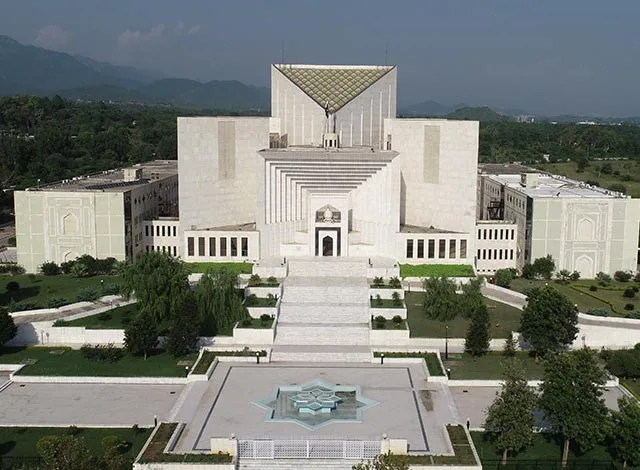
The recently passed 26th Constitutional Amendment, known as the “Constitutional Package,” has stirred debate across Pakistan, sparking discussions on whether it truly strengthens the judiciary or imposes executive control. Introduced by the ruling coalition, this amendment seeks to balance judicial independence with accountability. While the package addresses some long-standing issues within Pakistan’s judicial system, it has also raised concerns about the potential for increased executive influence over judicial matters.
A major aspect of the amendment is the limitation of the Supreme Court’s suo motu powers. Traditionally, Pakistan’s Supreme Court has enjoyed the authority to take up cases independently when it deems them to be in the public interest. This power has allowed the court to address critical matters swiftly, without waiting for formal applications. Under the 26th Amendment, however, the Supreme Court may only exercise such powers if prompted by a specific application, significantly curtailing its ability to initiate action autonomously. Proponents argue that this change reinforces democratic principles by preventing the judiciary from overstepping its bounds and encroaching on executive or legislative domains. On the other hand, critics argue that limiting suo motu powers could prevent the court from addressing pressing issues in a timely manner, particularly in cases where other branches may be unwilling to intervene.
The amendment also reforms the process of appointing Pakistan’s Chief Justice. Previously, the position was given to the senior-most judge of the Supreme Court. The new amendment empowers a 12-member Special Parliamentary Committee to choose the Chief Justice from among the three most senior judges. By bringing Parliament into the selection process, the amendment theoretically ensures greater transparency. However, opponents argue that this change opens the judiciary to political influence, undermining its independence. The amendment mandates proportional representation on this committee based on the strength of each parliamentary party, making it a multi-partisan body. Supporters see this as a safeguard against favoritism, as decisions require a two-thirds majority. Yet, this proportionality could also allow political interests to override judicial merit.
The amendment also restructures the judicial system by creating constitutional benches within the Supreme Court, specifically designated to address politically sensitive and constitutional cases. These benches are intended to alleviate the backlog of cases in Pakistan’s overburdened judiciary, a long-standing issue that has compromised citizens’ access to timely justice. Proponents believe that this division of responsibilities will improve judicial efficiency. However, concerns have been raised about potentially limiting the judiciary’s capacity to handle significant cases comprehensively, as individual judges will now specialize in different types of cases.
In addition to restructuring judicial appointments, the amendment introduces performance evaluations for high court judges. This move aims to enhance accountability by ensuring that judges adhere to standards of competence and efficiency. Under the new rules, judges whose performance is deemed unsatisfactory may be granted a grace period for improvement. Persistent failure to meet standards can result in their cases being referred to the Supreme Judicial Council for further review. This addition reflects the amendment’s goal of making Pakistan’s judiciary more accountable to its citizens.
The amendment also expands Parliament’s role in judicial governance by forming a secretariat for the Judicial Commission of Pakistan (JCP). The secretariat, staffed by a designated secretary, will oversee the commission’s functions, including evaluating high court judges’ performance. By formalizing this structure, the amendment seeks to make the judicial appointment and evaluation process more transparent and efficient.
Notably, the amendment introduces an entirely new right: the right to a clean and healthy environment. With Pakistan ranking among the countries most vulnerable to climate change, this addition is a proactive step towards addressing environmental issues within a legal framework. The new article guarantees citizens the right to a sustainable environment, providing a constitutional foundation for environmental litigation and policy development. It represents an alignment with global environmental standards and signifies Pakistan’s commitment to sustainable development.
While the 26th Amendment aims to address key issues within Pakistan’s judiciary, the question of executive overreach looms large. Involving Parliament in judicial appointments is a bold step that has the potential to either enhance transparency or compromise judicial independence. As Pakistan navigates these changes, the country’s judiciary faces the challenge of adapting to a system that balances accountability with autonomy. Ultimately, the success of these reforms will depend on their implementation and on safeguarding the judiciary’s ability to uphold constitutional rights impartially.
